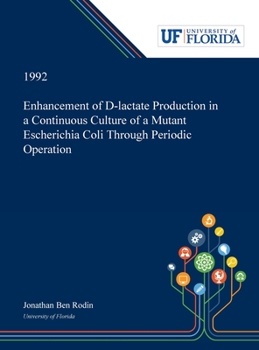Enhancement of D-lactate Production in a Continuous Culture of a Mutant Escherichia Coli Through Periodic Operation
Abstract: In some biological systems, the environmental conditions that are optimal for microbial growth differ from the optimal conditions optimal for producing a desired metabolite. If production of this metabolite were the process objective, one could continuously operate a reactor system at the optimal production conditions. However, for a given reactor volume, changing the conditions periodically could increase overall production of the desired metabolite. This is possible since, due to higher growth rates under the optimal growth conditions, one could operate the system at significantly higher flowrates and, thus, obtain more product A system involving E. coli mutant LCB898 was used as a model system. Under anaerobic conditions this bacterium will produce large amounts of d-lactic acid, whereas under aerobic conditions, this bacterium will grow faster. The possibility of increasing total lactate production by cycling dissoved oxygen was investigated. Before any optimization work could be done, an adequate model for describing the behavior of this system under both steady-state and transient conditions had to be developed and tested. Such a model was developed using batch and continuous data and then tested by comparison with shifts between conditions. A method for determining the optimal waveform for the proposed cycling was developed by extending previous work by Lyberatos and Svoronos. The method involved Carleman linearization of the model equations around a steady state and subsequent development of a term for the performance measure. The system studied oscillated between purely aerobic and anaerobic metabolisms with no intermediate conditions. Thus, an "imaginary" steady state of intermediate metabolism had to be used for linearization. In numerical simulation of the determined optimal cycling, significant improvement over strictly anaerobic operation was found. Experimental verification of this was performed and improvement, though not as significant as theoretical predictions would indicate, was found. Additionally it was found that the mutant was probably reverting to a form where little d-lactic acid was produced. Cycling of dissolved oxygen apparentiy helps delay this reversion. Dissertation Discovery Company and the University of Florida are dedicated to making scholarly works more discoverable and accessible throughout the world. This dissertation, "Enhancement of D-lactate Production in a Continuous Culture of a Mutant Escherichia Coli Through Periodic Operation" by Jonathan Ben Rodin, was obtained from the University of Florida and is being sold with permission from the author. A free digital copy of this work may also be found in the university's institutional repository, the IR@UF. The content of this dissertation has not been altered in any way. We have altered the formatting in order to facilitate the ease of printing and reading of the dissertation.
Format:Hardcover
Language:English
ISBN:0530018551
ISBN13:9780530018553
Release Date:December 2019
Publisher:Dissertation Discovery Company
Length:186 Pages
Weight:1.60 lbs.
Dimensions:0.5" x 8.5" x 11.0"
Customer Reviews
0 rating





